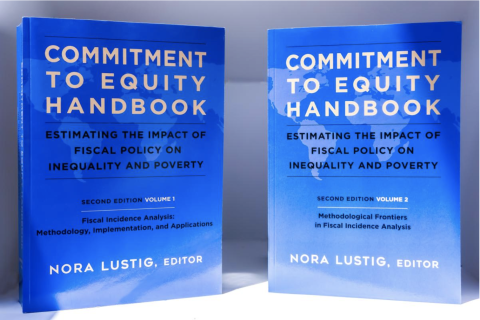New Commitment to Equity Handbook Offers Methods to Determine the Impact of Taxation and Public Spending on Inequality and Poverty
The Commitment to Equity Institute (CEQI) at Tulane University released the second edition of the Commitment to Equity Handbook: Estimating the Impact of Fiscal Policy on Inequality and Poverty, edited by Nora Lustig, Samuel Z. Stone Chair of Latin American Economics, and published by Brookings Institution Press and Rowman & Littlefield. The handbook is a unique manual on the theory and practical methods for determining the impact of taxation and government spending on inequality and poverty.
Founded in 2015 by Dr. Lustig, the CEQI works to reduce inequality and poverty through comprehensive and rigorous tax and benefit incidence analysis and active engagement with the policy community (as listed on their website). The second edition of the handbook offers policymakers, social planners, economists, and anyone interested in global inequality a strategy to apply fiscal incidence analysis, illustrated by cross-country comparisons worldwide. In addition to a step-by-step methodological guide, the second edition includes, among other topics, alternative approaches to value education, health services, and infrastructure, as well as how to determine the sustainability of fiscal redistribution.
According to Lustig, studying inequality and poverty matters beyond ethical reasons. She says inequality and poverty lead to lower social mobility, decreased growth, and social and political instability. One solution, she emphasizes, involves fiscal redistribution by taxing the wealthy and casting safety nets to people with low incomes.
She adds, “Taxes and transfers are among the most powerful policy instruments to reduce inequality and improve poor people’s living standards. Our work reveals to what extent governments use these instruments to make our societies more inclusive.”
The CEQ Data Center on Fiscal Redistribution allows researchers to examine the impact of fiscal systems on inequality and poverty in close to seventy countries around the world through Data Visualization Tools, Standard Indicators, Master Workbooks, Harmonized Microdata, Metadata, and Fiscal Policy and Inequality by Socioeconomic Categories. It also features two indicators that are used to monitor the progress on the United Nations Sustainable Development Goals.
The online version of the handbook is available free of charge on the CEQ Institute’s website.

